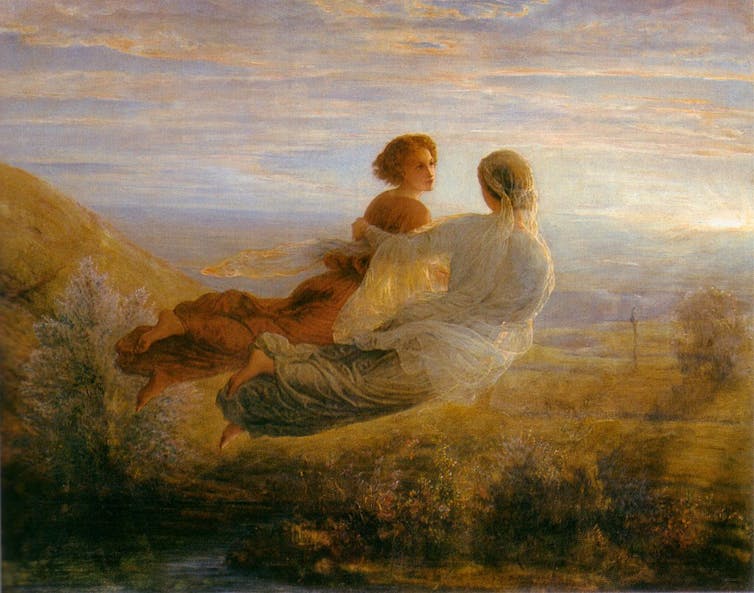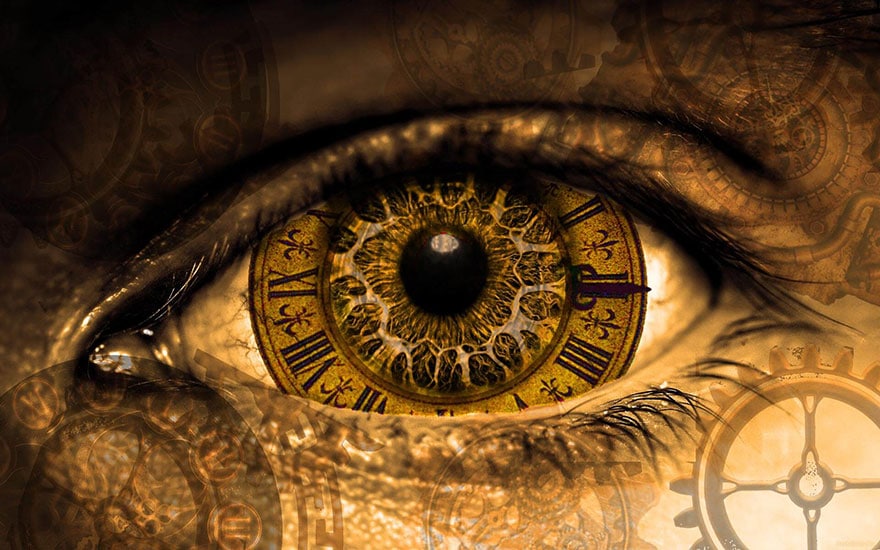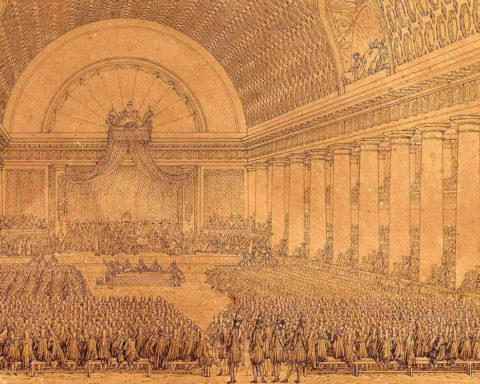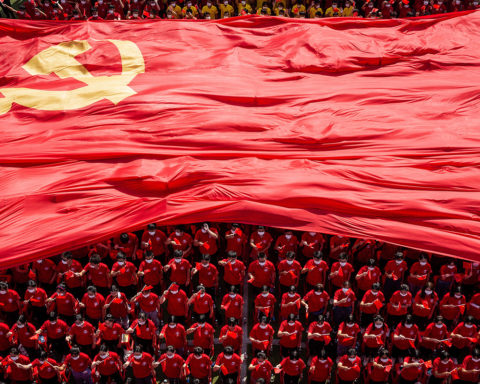Faire l’histoire de l’immortalité nourrit le paradoxe : si l’immortalité était effective, elle ne serait soumise à aucune historicité. L’histoire, le processus, l’évolution : autant de notions contraires à l’immortalité.
Il s’agit évidemment ici non pas de l’immortalité – dont on ne sait rien – mais bien de la pensée de l’immortalité et de ses grands jalons. Tenter d’en faire l’histoire – ce que nous ne pouvons faire ici de façon exhaustive, ni à la manière d’un historien des idées – c’est chercher, sous la pensée de l’immortalité, le rapport de l’homme à lui-même, de l’homme à l’autre que lui (la transcendance, les arrières mondes, Dieu) et de l’homme dans son rapport aux autres (son inscription dans la société des hommes, dans l’histoire, etc.).
Il va de soi que la pensée de l’immortalité va évoluer selon les découvertes scientifiques, les changements de paradigmes et de représentation du monde, l’évolution du rapport au temps, les croyances, la sécularisation, etc. Autrement dit qu’on ne peut en faire une histoire hors contextualisation.
Néanmoins, s’il est un invariant, c’est ce désir d’immortalité qui meut les hommes, dans leur ensemble, en tant qu’espère humaine – perdurer, résister aux catastrophes naturelles, à l’apocalypse, sur terre ou ailleurs, etc. et l’homme en particulier, cet individu voué à la mort, et dont l’activité incessante tend à en repousser le terme, ou à la dépasser en inscrivant pour les générations futures une trace de son passage.
Désir d’immortalité : l’invariant ; autour duquel l’immortalité change de forme en fonction des époques. Pour le montrer, nous renoncerons donc à une histoire à proprement parler, pour privilégier trois figures.
L’immortalité chez les Grecs
Hannah Arendt a rendu compte de la première dans plusieurs de ses ouvrages, mais nous citerons surtout « le concept d’histoire » publié dans la Crise de la culture. Elle y parle d’« immortalisation », cette action qui porte un nom en grec difficilement traduisible [αθαυατιζειυ], et qui engage trois types d’activité : l’objet qui immortalise mon action (une œuvre, une épopée, un monument…), l’action elle-même, en tant qu’elle est héroïque, glorieuse, et de ce fait mémorable, et enfin le choix de vie philosophique qui consiste à côtoyer les choses immortelles (les objets de la pensée).
L’immortalité chez les Grecs fait donc signe vers l’œuvre, l’action mémorable, ou la vie philosophique. Mais pour que cette action d’immortaliser soit possible, il fallait « un espace impérissable garantissant que l’« immortalisation » ne serait pas vaine », un espace politique où ces actions apparaissent. Il y a donc un lien organique entre le désir d’immortalité et la communauté politique, car elle seule garantit la possibilité même de se survivre.
Il faut pour comprendre cette idée – fort éloignée de notre propre conception de la communauté politique – rappeler que pour les Grecs le corps politique était la réponse au besoin de l’homme de dépasser la mortalité et la fugacité des choses :
« À l’extérieur du corps politique, la vie humaine n’était pas seulement ni même en premier lieu menacée, car exposée à la violence des autres ; elle était dépourvue de signification et de dignité parce qu’en aucun cas elle ne pouvait laisser de traces. »
Et Arendt de poursuivre :
« Telle était la raison de l’anathème jeté par la pensée grecque sur toute la sphère de la vie privée, dont l’ »idiotie » consistait en cela qu’elle se préoccupait seulement de survie » et de convoquer Cicéron pour qui « seules l’édification et la conservation de communautés politiques peut permettre à la vertu humaine d’égaler les actions des dieux. »
Voilà la polis promue comme lieu du commun, où les hommes libres tâchent de rendre manifeste ce qui seul peut les rendre éternels : la valeur, l’exemple, la justice, etc. qui égalerait l’Olympe des dieux.
L’immortalité est donc associée à un espace commun qui permet à la liberté de se déployer. Le politique est intrinsèquement lié à la possibilité d’une immortalité, c’est-à-dire pour les Grecs, d’une forme de mémoire qui exalte les valeurs de l’humanité.
L’immortalité des chrétiens, un changement de paradigme
Dès lors que l’immortalité est la récompense post-mortem d’une vie traversée par la foi et l’exercice spirituel – pour le dire très vite – le rapport au temps présent, au temps de la vie s’en trouve modifié. Et non seulement le rapport au temps, mais aussi et surtout à l’espace politique. Celui-ci est rétrogradé au regard du royaume divin.
L’immortalité est certes indexée à un certain type de comportement, d’obéissance, de ferveur – parfois même de prédestination comme chez Calvin, ou d’élection comme chez Luther, il n’en reste pas moins que le rapport au politique devient annexe, voire accessoire. Le salut ne viendra pas du monde des hommes, y compris ou encore moins de leur communauté politique, mais de l’âme ; et si communauté il doit y avoir, elle peut à la limite se penser comme ordre religieux, qui fait vœu de se couper plus ou moins radicalement du monde.
Il y a de nombreuses modalités théologiques, des variantes infinies au sein de l’espace chrétien : ce qui demeure, c’est cette partition entre la terre et les cieux, le corps et l’âme, la mortalité et l’immortalité. Et plus qu’une partition, c’est une scission.

Louis Janmot, « Le Poème de l’âme 16 », Le vol de l’âme.
Il se peut que la parole de l’évangile incite à faire le bien autour de soi, à organiser une société plus juste, il se peut que le message du Christ rejoigne l’action révolutionnaire, il se peut que l’interprétation des textes ait une efficience ici et maintenant ; il n’empêche, la vraie vie est ailleurs. Ce qui permet à l’occasion de nourrir une forme de résistance intérieure à la tyrannie, de survivre à l’horreur organisée des hommes, de se révolter contre les iniquités, mais c’est toujours au nom d’autre chose.
La transcendance porte plus de promesses que l’immanence. L’au-delà est plus gratifiant que l’ici-bas. Pourquoi changer le monde puisque le vrai monde est ailleurs ? Le sacrifice des premiers chrétiens, aujourd’hui les attentats kamikazes au nom d’une autre religion du livre, montrent bien le désintérêt pour la vie terrestre au profit d’une vie éternelle.
Avec le transhumanisme, une immortalité consumériste
Changement plus radical encore de paradigme : l’immortalité à l’heure du transhumanisme. Le désir est toujours là, intact, de perdurer au-delà de soi-même, de ne jamais mourir. Mais l’immortalité a complètement changé de visage : il ne s’agit plus d’exploit héroïque dont la mémoire sert l’édification des jeunes générations et crée un pont entre les différents âges de l’humanité ; il ne s’agit plus non plus de mépriser les biens de ce monde, avec la conviction que nous attend un paradis au-delà de la mort.
Certes, l’histoire est passée par là, les progrès scientifiques nous ont transportés d’un monde clos et orienté, à un univers infini où l’homme n’est que poussière, mais où il retrouve une dignité par sa foi en Dieu et par sa découverte de la conscience, puis à un monde potentiellement fini depuis que l’homme l’a modifié sans retour en arrière possible, au point de créer à l’aide des lois de la nature des armes qui peuvent la détruire. La conception du temps aussi a changé : il a été cyclique pour les Grecs, puis orienté vers un progrès infini dans la modernité, il a été assujetti à ce que les hommes pensaient pouvoir créer – leur histoire. La croyance au progrès a cédé la place à la perspective apocalyptique de la fin : destruction des ressources naturelles, réchauffement climatique sont comme autant de signes d’une irréversibilité qui infléchit l’idée même du futur.
Aujourd’hui, le temps s’empêtre dans un présent sans cesse recommencé, il s’est accéléré au point de bégayer, il s’ouvre à un flux permanent d’informations détemporalisées en demeurant sur la toile, ou oubliées à peine énoncées, pour être remplacées par d’autres. Un temps désynchronisé, qui ne suit plus la révolution des planètes ni le rythme des saisons, qui ne suit plus un rythme commun : mais un temps où l’homme demeure mortel, et cet obstacle aux progrès de la science – et à l’hybris qui lui est constitutif – lui apparaît comme une humiliation.

L’être humain désire l’immortalité : mais désormais pour lui-même. En tant qu’être vivant et non plus en tant que héros qui laisserait à méditer une action porteuse de valeurs ; une immortalité qui ne consacrerait pas les efforts de son âme, ni qui serait le résultat d’une promesse fondée sur la seule croyance : il faut de l’immortalité ici et maintenant. Cette immortalité, on ne la cherche plus à travers ce qui faisait l’immortalité chez les Grecs, et en quelque sorte chez les chrétiens : des valeurs immortelles, qu’on les dise humaines ou divines, naturelles ou métaphysiques, au-delà des individus de passage et des vies éphémères. Des valeurs qui pouvaient faire communauté, et mémoire de communauté.
Le transhumanisme, lui, propose une immortalité qui n’est que continuité biologique, même si la biologie est elle-même modifiée – on reste dans le champ du vivant et non dans celui des valeurs. Le combat pour l’euthanasie montre qu’il est une chose supérieure à la vie : la dignité. Le transhumanisme est un projet eugénique, qui fait de la vie la valeur suprême. L’immortalité que la science promet est une immortalité de consommation, un bien que l’on peut acquérir moyennant finance. Elle n’échappe pas au règne économique d’un capitalisme moniste : elle en manifeste même la vérité, ou ce qui fait la singularité de notre époque. Nul besoin d’inscrire une trace – toutes les traces s’effacent, et il n’y a plus d’espace politique pour la conserver : les seuls lieux de mémoire tendent à devenir cette immense mémoire des big data : tout s’y préserve au même titre. C’est la trace qui prime sur ce dont elle est la trace. Elle s’inscrit dans un flux continu – qu’elle soit trace d’un fait individuel ou d’une action collective. Les deux sont des data, et s’ils donnent lieu à des commentaires, ceux-là à leur tour deviennent des data. La valeur des choses est nivelée, rabattue sur leur statut de fait.
Si les faits n’ont plus de valeur et s’il n’y a plus d’espace où cette valeur peut être interrogée, critiquée, partagée, s’il n’y a plus d’arrière monde, ou si le risque est trop grand de déléguer l’immortalité à une simple croyance, dans un régime où les assurances calculent au plus avantageux le rapport au risque, si enfin la vie a un prix convertible en monnaie, alors l’immortalité aussi : elle n’est plus cet incommensurable qui guide, elle est un commensurable qui se calcule. Puisqu’elle n’est rien de plus que de la vie. Le simple fait de la vie. Logique de survivants. Durer le plus longtemps possible. Achille avait préféré une vie courte, mais une vie valeureuse. Privilégiant pour cela le coup d’éclat à la vie privée, dont – je rappelle les mots cités plus haut, « l’ »idiotie » consistait en cela qu’elle se préoccupait seulement de survie »…
Les choix ne se posent plus de la même manière. C’est le cadre même du questionnement qui s’est transformé. La notion d’immortalité en est l’un des symptômes.

Mazarine Pingeot est professeur agrégée de philosophie, Université Paris 8 – Vincennes Saint-Denis
La version originale de cet article a été publiée sur The Conversation.












